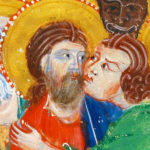We run our website the way we wished the whole internet worked: we provide high quality original content with no ads. We are funded solely by your direct support. Please consider supporting this project.
How do you respond to Daniel 2:31–45?
Daniel interprets Nebuchadnezzar’s dream to the effect that he possesses a kingdom of “gold” (vs. 38). After this there shall arise “another kingdom inferior to yours, and yet a third kingdom of bronze which shall rule over the whole earth. And there shall be a fourth kingdom, strong as iron…it shall crush and shatter all these” (vs. 39–40).
There is a good deal of scholarly debate about which kingdoms Daniel is referring to, complicated by the fact that scholars even disagree over the dating and authorship of this work. This need not concern us, however. For the purposes of our present investigation we may grant that the text presupposes that God foreknows the succession and relative strength of several future kingdoms. Does this mean that everything about the future is settled and known by God as such? I don’t see why we should conclude this.
The Lord in his infinite wisdom is able to providentially determine the general duration and parameters of national powers without thereby determining or foreknowing what every free agent within those nations will do. God sovereignly outlines the skeletal structure of his providential plan and allows the decisions of free agents to flesh it out. A ship that is bound for the coast of Italy is in this sense predestined, though the people on the ship are free to move around as they please.
Perhaps a better analogy is to be found in a children’s “Choose Your Own Adventure” book. In these books an author writes a number of possible story lines and allows the reader to create their own story by choosing between them. The author provides a structure to the book as a whole as well as to each possible story line within the overall structure. But there is also room for freedom on the part of the reader to create their own story by choosing between the alternatives that the author has given.
This is a model (albeit, radically simplified) of how we may understand God’s sovereign design allowing for some openness in the future. The “God of the possible” is the author and governor of the whole story line of creation as well as the one who offers various possible alternatives to his human creations. The rise and fall of nations, it seems, is usually providentially guided according to God’s plans for world history (cf. Dan. 2:20). But within this general guidance there is plenty of room for individuals to exercise free will.
Along these lines, Paul proclaims that God “made all the nations to inhabit the whole earth, and he allotted the times of their existence and the boundaries of the places where they would live” (Acts 17:26). This is part of the structural outline of God’s plan for world history. These providential parameters certainly condition the scope of human freedom, but they do not destroy it—just as our genes and environment condition our individual freedom without destroying it.
Paul himself says that God sets up these times and boundaries for nations with the hope “that they [the nations] would search for God and perhaps grope for him and find him” (Acts 17:27). There is, we see, ordained structure balanced by freedom. God determines whatever he sees fit and leaves as much of the future open to a “perhaps” as he sees fit. The “God of the possible” creates the “Choose Your Own Adventure” skeletal outline of world history within which the possibilities of human free choice are actualized.
Category: Q&A
Tags: Open Theism, Q&A
Topics: Open Theism, Responding to Objections
Verse: Daniel 2
Related Reading

How do you respond to Galatians 1:15–16?
“…when God, who had set me apart before I was born and called me through his grace, was pleased to reveal his Son to me…I did not confer with any human being…” As with Jeremiah (Jer. 1:5), John the Baptist (Luke 1:13–17) and other God-ordained prophets, Paul was aware that God had decided on a…

What is the significance of Numbers 11:1–2?
The Lord was in the process of judging Israel by fire when Moses interceded in prayer “and the fire abated.” A common sense reading of the verse suggests that the fire would have continued had Moses not prayed. Scripture is full of examples of God changing his plans in response to human prayer and repentance.…

Did God Predestine Judas to Betray Jesus? (podcast)
Greg talks about the role Judas played in the crucifixion of Jesus and speculates about his potential for good. Episode 516 http://traffic.libsyn.com/askgregboyd/Episode_0516.mp3

What is the significance of Isaiah 5:3–7?
The Lord describes Israel as his vineyard. Referring to himself, he says that the owner of the vineyard loved his vineyard and did all he could to care for it. “[H]e expected it to yield grapes, but it yielded wild grapes” (vs. 2). Then the Lord asks, “What more was there to do for my…

How do you respond to 1 Timothy 1:9?
“[God] saved us and called us with a holy calling, not according to our works but according to his own purpose and grace. This grace was given to us in Christ Jesus before the ages began…” Compatibilists sometimes appeal to this verse to support the view that God determined who would (and thus who would…

How do I avoid feeling like God is absent?
Question: I used to see God involved in everything and used to believe every event expressed God’s will. After my wife and I lost our child in a tragic accident, and as a result of reading your books (especially Is God to Blame?), I came to embrace the warfare worldview and the open view of…
